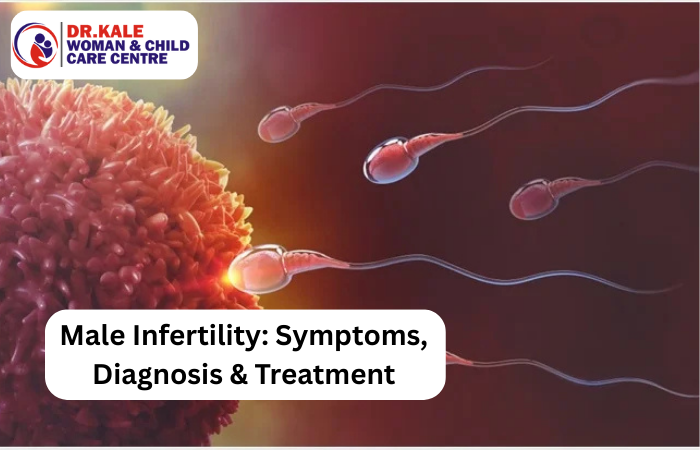Infertility is often thought of as a women’s issue, but in reality, men contribute to about half of all infertility cases worldwide. Male infertility is defined as the inability of a man to cause pregnancy in a fertile female partner after 12 months of regular, unprotected intercourse. It can be caused by problems with sperm production, sperm function, or blockages that prevent sperm delivery.
Understanding the signs, causes, diagnosis, and available treatments for male infertility is an important step in addressing this sensitive health issue.
What is Male Infertility?
Male infertility occurs when a man has difficulty producing healthy sperm, or when there are structural or hormonal issues that affect sperm delivery. While it can feel overwhelming, the good news is that medical advancements have made diagnosis and treatment more effective than ever before.
Symptoms of Male Infertility
Male infertility doesn’t always have obvious symptoms, but some signs may indicate underlying issues:
- Difficulty conceiving: The most common symptom is the inability to achieve pregnancy despite trying for a year.
- Hormonal imbalances: Low testosterone can cause reduced sexual desire, fatigue, or decreased muscle mass.
- Erectile or ejaculation problems: Difficulty maintaining erections or issues with ejaculation can interfere with conception.
- Pain or swelling in the testicles: May suggest infection, varicocele, or other reproductive system disorders.
- Abnormal hair growth: Lack of facial or body hair may indicate hormonal imbalances.
Causes of Male Infertility
Male infertility can be due to one or more of the following factors:
- Sperm Production Issues – Low sperm count, poor sperm motility (movement), or abnormal sperm shape reduce the chances of fertilization.
- Blockages in the Reproductive Tract – Obstruction in the vas deferens or epididymis prevents sperm from being released.
- Varicocele – Enlarged veins in the scrotum that impair sperm quality.
- Hormonal Disorders – Imbalances in testosterone, FSH, or LH affect sperm production.
- Genetic Conditions – Such as Klinefelter syndrome or Y-chromosome deletions.
- Lifestyle Factors – Smoking, excessive alcohol, obesity, drug use, stress, and poor diet contribute to infertility.
- Medical Conditions – Diabetes, infections, or cancer treatments like chemotherapy and radiation can affect fertility.
Diagnosis of Male Infertility
Accurate diagnosis is crucial for determining the right treatment. A fertility specialist typically recommends:
- Medical History & Physical Exam – Checking for hormonal or genetic conditions, past illnesses, and lifestyle habits.
- Semen Analysis – The most common test to assess sperm count, motility, and morphology.
- Hormone Testing – To measure testosterone and other hormones regulating sperm production.
- Scrotal Ultrasound – Identifies blockages, varicocele, or abnormalities in the testicles.
- Genetic Testing – To detect inherited conditions that may affect fertility.
- Testicular Biopsy – In rare cases, tissue samples are taken to assess sperm production.
Treatment Options for Male Infertility
Treatment depends on the underlying cause and may involve medical, surgical, or lifestyle interventions.
1. Medications
- Hormone replacement or therapy for imbalances.
- Antibiotics to treat reproductive tract infections.
- Medications to improve sperm production.
2. Surgical Treatments
- Varicocelectomy: Surgery to repair varicocele and improve sperm quality.
- Vasectomy reversal: Restoring sperm flow after a previous vasectomy.
- Sperm retrieval techniques: For men with blockages or low sperm production.
3. Assisted Reproductive Techniques (ART)
- Intrauterine Insemination (IUI): Processed sperm is placed directly into the uterus.
- In Vitro Fertilization (IVF): Eggs and sperm are combined in a lab before transferring embryos into the uterus.
- ICSI (Intracytoplasmic Sperm Injection): A single sperm is injected directly into the egg, useful in cases of severe male infertility.
4. Lifestyle & Natural Approaches
- Eating a balanced diet rich in antioxidants.
- Maintaining a healthy weight.
- Reducing stress and getting regular exercise.
- Quitting smoking and limiting alcohol.
Emotional & Psychological Impact
Male infertility can cause emotional distress, low self-esteem, and relationship strain. Counseling and support groups play an essential role in helping couples navigate the psychological challenges of infertility treatment.
Male Infertility Care in Moshi
If you and your partner are struggling with infertility, consulting an expert can make a life-changing difference. At her clinic Dr. Jyoti Kale, an experienced Gynecologist and Obstetrician in Moshi , provides comprehensive evaluation and treatment for infertility, including specialized care for male infertility. With a patient-centered approach and advanced diagnostic methods, she ensures couples receive the right guidance and support throughout their fertility journey.
FAQs on Male Infertility
Q1. Can lifestyle changes alone improve male infertility?
Yes, in some cases. Quitting smoking, eating a nutrient-rich diet, exercising, and reducing stress can significantly improve sperm quality.
Q2. Is male infertility permanent?
Not always. Many causes of male infertility are treatable with medication, surgery, or assisted reproductive techniques.
Q3. How common is male infertility?
Studies show that male factors contribute to around 40–50% of infertility cases in couples worldwide.
Q4. Does age affect male fertility?
Yes, although men produce sperm throughout life, sperm quality and motility decline with age, particularly after 40.
Q5. Can stress cause male infertility?
Chronic stress can affect hormone balance, reduce libido, and impact sperm production, contributing to infertility.


